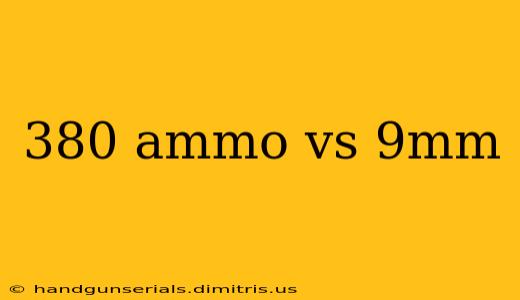Choosing the right caliber for self-defense is a critical decision, and the .380 ACP and 9mm are two popular choices often debated among firearm enthusiasts. This detailed comparison will analyze both cartridges, focusing on factors like stopping power, recoil, capacity, and suitability for concealed carry. Understanding these nuances will empower you to make an informed choice based on your individual needs and preferences.
Stopping Power: The Crucial Factor
Stopping power, the ability of a round to incapacitate a threat, is paramount in self-defense. While a definitive answer is elusive due to variables like shot placement and target physiology, generally, the 9mm boasts superior stopping power compared to the .380 ACP. The 9mm's larger diameter and higher energy transfer lead to significantly larger wound channels and a greater likelihood of immediate incapacitation. However, proper shot placement remains the single most important factor regardless of caliber.
.380 ACP: Limitations and Advantages
The .380 ACP, while smaller and less powerful, still offers advantages. Its lower recoil makes it more manageable for smaller individuals or those new to firearms. This manageable recoil translates to faster follow-up shots, a critical aspect in a self-defense situation. Its smaller size also allows for more compact and concealable firearms. However, the trade-off is reduced stopping power, necessitating more precise shot placement to achieve the desired effect.
9mm: Power and Versatility
The 9mm's superior stopping power and wider availability of ammunition make it a popular choice for self-defense. The range of 9mm ammunition, including jacketed hollow points (JHP) designed for expansion and increased stopping power, further enhances its effectiveness. Its versatility extends to its use in a broad array of firearms, from compact pistols ideal for concealed carry to larger handguns offering higher capacity.
Recoil and Control: A Matter of Personal Preference
Recoil is a subjective experience, varying based on individual factors like strength and shooting technique. Generally, the .380 ACP exhibits significantly less recoil than the 9mm. This can be advantageous for those with less upper body strength or those seeking a less jarring shooting experience. However, reduced recoil doesn't necessarily equate to better accuracy, especially for inexperienced shooters.
Magazine Capacity: Rounds Available
Magazine capacity is a critical factor in self-defense situations. Typically, 9mm pistols offer higher magazine capacities than .380 ACP pistols. This means more rounds available in a confrontation. While this might seem insignificant in theory, in a high-stress scenario, additional rounds could be the deciding factor.
Concealability: Size and Weight
Concealability is often a key driver in choosing a self-defense firearm. Generally, .380 ACP pistols are smaller and lighter than their 9mm counterparts, making them easier to conceal under clothing. However, advancements in 9mm pistol design have resulted in increasingly compact and concealable options, blurring the lines between the two calibers.
Ammunition Availability and Cost: Considerations for Long-Term Use
Ammunition availability and cost are practical considerations. 9mm ammunition is generally more widely available and often less expensive than .380 ACP ammunition, making it a more cost-effective choice for practice and training.
Conclusion: The Best Caliber for You
Ultimately, the choice between .380 ACP and 9mm depends on individual needs and priorities. If stopping power is your top priority, the 9mm is the clear winner. However, if manageable recoil and extreme concealability are paramount, the .380 ACP may be a better fit. Consider factors like your physical strength, shooting experience, and the level of concealability needed before making a decision. Regardless of caliber, rigorous training and proficient marksmanship are crucial for safe and effective self-defense. Consult with experienced firearm professionals and receive proper training before carrying any firearm.

